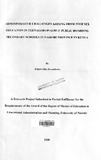| dc.description.abstract | The aim of this study was to find out administrative challenges that arise from peer sex education in girls’ public boarding secondary schools in Nairobi Province in Kenya. Six research questions were formulated to guide the study. Research Question One sought to establish why teenagers rely on their peers more for sex information than on their parents and teachers; Research Question Two was to explore how sex information is passed from one teenager to another; Research Question Three aimed at establishing the kind of content peers provide to teenagers in regard to sexuality; Research Question Four was to enable the researcher identify which peers are most active in passing sex information among teenagers; Research Question Five sought to establish the challenges administrators face when teenagers learn sexuality from their peers and Research Question Six sought for recommendations for ensuring that teenagers get the right information on sexuality.
The study used both qualitative and quantitative analysis. The respondents were selected through probability and non probability sampling. The students were chosen using simple random sampling. The respondents in the category of Deputy Principals and counsellors were selected through purposive sampling. Data was collected using structured questionnaires. To strengthen the data obtained from questionnaires, focus group discussions and interview schedule with Deputy Principals were also carried out.
v
Data was analysed using descriptive statistics. The studies indicated that the teenage girls did not sit with parents/guardians to discuss sexuality because the parents/guardians were either busy or too harsh. Teenagers said that teachers also did not encourage discussions on issues outside class work. For those that indicated that they sit and talk with the parents and teachers (32%), the main topics of discussion were academics, character, and value of virginity, salvation and issues to do with the entire family.
With regard to sources of sex information, the respondents cited Christian books, pastors, peers and peer counsellors, sisters, boyfriends, cousins, aunts and other relatives as the main sources. Magazines, television programmes and shows as sources of this information also featured prominently. Most of the teenagers (86%) indicated that they shared the information acquired with other teenagers. They said that peers were open minded and understanding. They however indicated that peers could easily provide dangerous and misleading information about sexuality because they were inexperienced. Deputy Principals revealed that peer sex education affected the mode of dressing. The students tended to ape models and fashions that appeared on television and magazines. They tended to expose their bare backs or stomachs, made exaggerated long slits on their skirts, tightened them and conducted fashion shows during preps. Counsellors said that teenagers developed wild imaginations because they learnt ‘raw sex’. Some, even contemplated or engaged in gay relationships. Such behaviour inhibited learning.
vi
Based on the findings, the study made a number of recommendations that would enable administrators deal with challenges arising from peer sex education. Firstly, teachers and parents should be sensitized on the need to address all teenagers’ needs wholly. Secondly, peer counsellors should be trained. Time should also be allocated for sex education.
Taking the limitations and delimitations of the study, the researcher suggested that since the study was limited to girls’ public boarding secondary schools in one province, there was need to conduct a similar research in private girls’ boarding secondary schools in the province and girls’ public boarding secondary schools in other provinces. | en_US |

